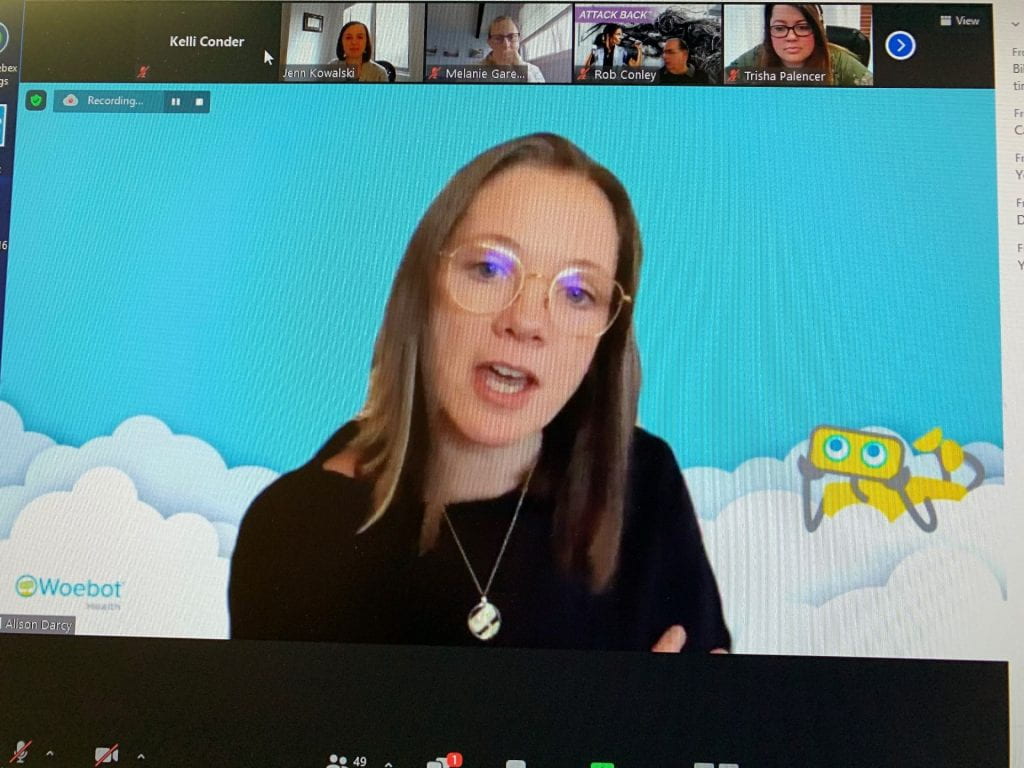
Alison Darcy PhD, Founder & President of Woebot Health presents as a part of the Indiana Life Sciences Collaboration Conference panel on advances in mental health treatments.
Summaries by Mitchell McBrairty
MBA Candidate, Class of ’21
On Friday, February 19th the Kelley Center for the Business of Life Sciences hosted its Indiana Life Sciences Collaboration conference focused on the advances in mental & behavioral health. Special thank you to series sponsors: Anthem, Covance & Reckitt Benckiser and Primary Sponsors: Baxter, Boston Scientific, Fort Wayne Metals, Ice Miller LLP and Eli Lilly and Company for helping to support this event.
Links to presentations and a short synopsis of the topics covered is presented below:
View Keynote- On the Cutting Edge of Brain Research
William Hetrick, PhD, Professor & Chair, Department of Psychological and Brain Sciences, Indiana University
The conference started with a masterful keynote from Will Hetrick, Professor & Chair of Psychological and Brain Sciences at Indiana University. He shared the current state-of-the-art research at IU that is making huge advancements in our understanding of the human brain. This included new studies that show a mechanistic understanding of brain development, revealing an enzyme in the brain responsible for neural migration that is disrupted during Fetal Alcohol Syndrome. He showed the advancements in the experiments that can be used to probe for scientific evidence, including a novel rat model of episodic memory and new imaging techniques to uncover the different structures of neural connectivity. I was especially fascinated by the data showing that brain function is distributed, and that the model of mental processes belonging to specific brain regions has been replaced by “fingerprints” of different neural network connections. The next topic of research that showed a healthy social network can reduce the onset of Alzheimer’s and how we can complement the gold standard of clinical trials with real world evidence studies. All of these research programs are advancing our understanding of brain function and uncover truths that will eventually lead to new therapeutic interventions.
View Panel – The Latest Treatments and What’s Next
Jennifer Kowalski, Vice President, Public Policy Institute, Anthem; Rob Conley, MD, Chief Science Officer, Neuroscience Development, Eli Lilly and Company; Alison Darcy, PhD, Founder & President, Woebot Health; Melanie Gareau, PhD, Associate Professor, School of Veterinary Medicine, University of California, Davis;Trisha Palencer, LCSW, LCAC, TTS Director, Addiction Treatment and Recovery Center, IU Health West Hospital
After the morning keynote, which took a deep dive into the basic research at IU into brain health, a panel of speakers showed us how this research can translate into therapies to help patients suffering from behavior or mental health crises. It was interesting to see the how many different ways technology can be applied. These included:
- New antibody therapies for the treatment of Alzheimer’s disease and chronic pain.
- An AI that specialized in human centered conversational therapy that improves outcomes for depression.
- A new workflow centered around recovery therapy for substance abuse that understands the drivers of addiction and creates a recovery plan that is focused on patient needs.
- Probiotics and postbiotics that help regulate the signaling between the gut-brain axis.
These are all incredible new applications of our latest understanding in brain research and are creating solutions for diseases that have historically had relatively poor treatment options.
View Fireside Chat – The Effects of the Covid Pandemic
Kevin Woodhouse, Partner, Ice Miller LLP; Susan Coakley, JD, MPH, Interim President, Beacon Health Options; Geoffrey Fortner, MD, Physician Executive, Community Fairbanks Behavioral Health, Community Health Network; Jay Chaudhary, JD, Director, Division of Mental Health and Addiction, Indiana Family and Social Services Administration
In the final session of the conference, a fireside chat discussed how Covid-19 has affected how we deliver mental health treatment services. More specifically, they described the pandemic as an accelerant. This means that services such as telehealth which were in their infancy have exploded in popularity out of pure necessity, and therefore we have traversed the learning curve much faster than what would have occurred normally. This discussion also aimed to understand how we can make sure that these events do not also accelerate social inequalities due to the lack of access to information, technology, and changing healthcare services.
Other difficulties in a socially distant world include the effects of isolation, blurring lines between work and personal life, and the toll it has taken on the social development of children. We are incredibly lucky to have a wide range of professionals who have made it their mission to improve our mental health in this tough situation.
Leave a Reply